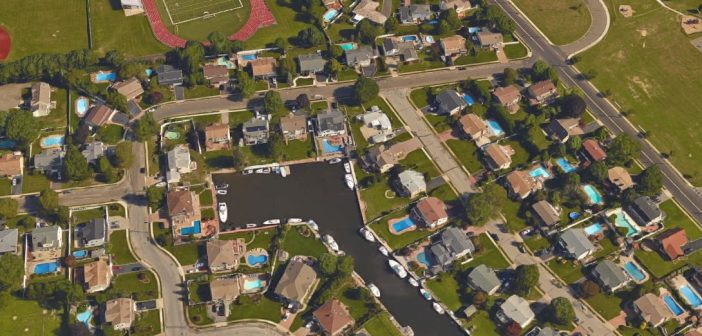You may have found your dream house, but is it located in your dream neighborhood? The location your potential new home is in is just as important as the house. Too many people have made the mistake of ignoring the neighborhood their new home is in. This could lead to regret lasting years and years. Avoid these mistakes and know what to look for when considering a new home. Here is a handy list of nine factors to consider when choosing a neighborhood.

1. Your Neighbors
Always check out your new potential neighbors when considering buy a new home. They can really make or break your decision. It would be ideal if your neighbors were friendly normal people just like you, but this isn’t always the reality. Scope out your neighbors and find out whether they are aggressive people, a registered sex offender, or a frat house hosting daily parties. If your neighbors are normal people, find out whether they have children as they could be potential friends with your children. Neighbors can serve as support during difficult times. Don’t get stuck in a home where your neighbors are causing you constant trouble.
2. Convenience
This is one of the most important things to consider in the neighborhood around your home. Check to make sure grocery stores are within a five minute or less driving distance. Aside from groceries, consider how close necessities are like hospitals, police, and fire stations. If a natural disaster were to ever occur, having access to immediate help can be a life saver. It’s better to be safe than sorry. Imagine the nightmare you would be living through if you had to have a loved one air-lifted to a hospital located an hour or more away.
3. Schools
Regardless of whether you have children or not, it is important to scope out the schools near your potential new home. Schools a block away can be a great convenience if you have children, but can also quickly become a nightmare because of the high car and foot traffic. A college or university could also be stationed near your home, which gives a great indication of the type of neighbors you will have, college students still adjusting to adult life. Not only this but parking spaces will become limited during school hours. Living near a good school is beneficial, but make sure it isn’t located too close to your home to avoid these traffic disasters.
4. Recreation
Imagine living in a town without culture, recreation, and entertainment. Your new home life can quickly become boring and you might end up dropping hobbies. Before buying a home, consider what forms of recreation and entertainment are located nearby. Look for hobby stores, movie theaters, gyms, and restaurants. If you ignore these places, you will be stuck in your home with nothing to do. Having these spots close to your home not only enrich your life but can also become beneficial to your children. You may consider signing them up for a dance class or for weekly strolls in your local park.
5. Noise and Scents
Your real estate agent may ‘forget’ to tell you that your potential new home is located near a railroad or they will tell you that after a week or two you won’t even notice it. Don’t be fooled by this statement. Take a look at sources of loud noise or smells located near your home. Avoid buying a home near a sewage or water treatment plant or you may just find yourself wondering what that toilet smell lingering in the air is. It is also advised to look for homes situated away from high traffic main roads or airports as they can be terrible sources of noise around the clock, including hours after midnight.
6. Crime Rates
The safety of your family is important and should never be compromised. The new home and neighborhood might be beautiful and dreamy but could be hiding a dark secret: high crime rates. Do some research about the neighborhood and take preventative measures. Are there high rates of home invasion and theft? Is arson a common issue the neighborhood has to address on a weekly basis? Are any of your neighbors registered sex offenders and is there a large concentration of them located near your home? You should answer all of these questions for yourself when you are doing crime research on your potentially new neighborhood. It would be best to find out before you buy rather than after you become a victim of a crime the first week you move in.

7. General Environment
Don’t ignore small details around your potential home. Look around for sidewalks, potholes in the roads, the lawns, and trees of your neighbors. All of these are telltale signs of a well kept and organized neighborhood. Missing sidewalks, cracks in the roads, garbage laying around, and lack of trees are indicators of a poor neighborhood economy. The city might not be paying as much attention as it should to its citizens. Taking a walk around a bad and unkempt neighborhood can make you feel uncomfortable. Places that are located within walking distances would become out of the question. Avoid neighborhoods that have been shown little care and love.
8. Commute Times
Aside from distance between your home and hospitals, groceries, and other necessities, you should not forget to consider your daily commute to school or work. Investigate what the traffic is like in the neighborhood. It might be troublesome if your job is located seemingly an hour away, but the town’s traffic might significantly alter that time. High traffic can turn an hour drive easily into a two or three-hour drive. Don’t lie to yourself and convince yourself that a longer drive to work or school is worth your new beautiful home because two weeks in you will sorely regret the decision.
9. Commercial Centers
Wouldn’t it be a shame if you have a great new home, but you were unable to fill it with new furniture? Shopping and commercial centers are vital to a great neighborhood. They can provide daily necessities, but also forms of entertainment and shopping experiences. Look around your neighborhood for malls and commercial centers where you can buy goods and services. You might even discover a hole-in-the-wall tea shop or world famous spa. Take these small details into consideration when considering your new home.
After you have checked off these tips on your new home research list, you might find yourself considering a different home in a different neighborhood. These factors can make and break your decision and will save you from making vital mistakes you will regret after buying.







